Few things in Asheville are more contentious than short-term rentals. The industry, which includes platforms such as Airbnb and Vrbo, has been criticized for exacerbating the city’s affordable housing crisis and altering the character of its neighborhoods. Advocates counter that the STR business allows residents to take part in Asheville’s tourism economy and offset the city’s ever-rising cost of living.
Asheville’s leaders attempted to strike a compromise through a 2015 ordinance. Residents were authorized to operate homestays, renting up to two rooms on a short-term basis while living in the same house. But the city simultaneously banned whole-house rentals of less than 30 days in residential areas, with exceptions for operators renting prior to the ordinance’s adoption or who received conditional zoning approval. City Council further tightened the rules in 2018, outlawing new whole-house STRs in most commercial districts.
The 2015 ordinance also started a paper trail for the local STR industry. Homestay operators are required to apply for permits with the city, submitting their addresses, names and other identifying information. (Industry data suggests that hundreds of whole-house rentals operate illegally in the city as well, but detailed information on those rentals isn’t publicly available.)
In an effort to understand Asheville’s homestay market and its impacts, Xpress worked with Asheville-based data journalist Elliot Patterson to explore homestay permit data. The results, which can be viewed in full at avl.mx/ctb, give insights into how the market has changed over time, where homestays are located and who’s operating them. Because the city’s data is limited to permitted homestays within city limits, the analysis does not include STRs in unincorporated Buncombe County, which do not require permits, or illegal whole-house rentals in Asheville.
Growth or catch up?
According to data available from the city’s open records portal, permitted homestays in Asheville have grown from eight in 2015, when the permitting requirement first started, to 826 in 2023. Xpress used those records as the basis for this story.
Those permits, however, might not paint an entirely accurate picture of how many homestays are in operation and how they grew over time. Asheville Planning and Development Division Director Chris Collins says that homestay operators took several years to comply with the 2015 permit requirement, causing the city’s data to lag behind reality.
In addition, city staff reports from 2018 indicate that active Asheville homestay permits reached 603 in that year, whereas the current city database shows just 298 active permits at the time. Collins wasn’t able to explain the discrepancy, but he noted that many of the city’s information technology and permitting staff had left the department in recent years.
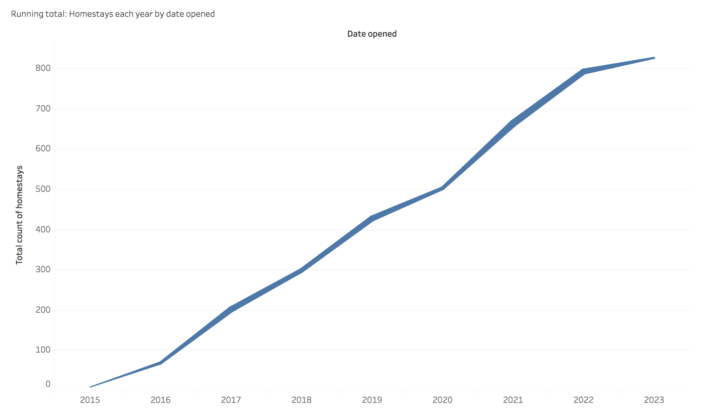
The COVID bump
The most requests for new permits in a single year occurred in 2021, which saw 161 applications, more than double the 75 requested in 2020. Another 129 new permits were requested in 2022, a number lagging only the previous year’s requests and the 133 permits requested in 2017.
Christine Smith operated a homestay in Asheville from 2015-19 and currently works as a vacation rental consultant in Asheville. She says that some homeowners started renting their properties to generate additional income while facing an uncertain future in the wake of the COVID-19 pandemic.
“When COVID hit, people were scrambling to figure out how to make it work, and some people realized they can now shift how they do business with all this extra free time,” Smith explains. “Homestays became an option for some people.”
As homeowners embraced the market, demand for homestays and other STRs also surged from travelers seeking to avoid public spaces like hotels. A November 2020 report from the Buncombe County Tourism Development Authority showed that hotel occupancy stood at 77% for October of that year, down from 82% for the same month in 2019. Meanwhile, occupancy for STRs, including those outside Asheville city limits, rose from 65% to 82% over the same period.
By 2022, the importance of STRs to Asheville’s lodging market had become undeniable. That summer, the N.C. General Assembly approved new legislation that explicitly required someone from the vacation rental industry to serve on the BCTDA board, among other changes.
The ‘kitchen rule’ effect
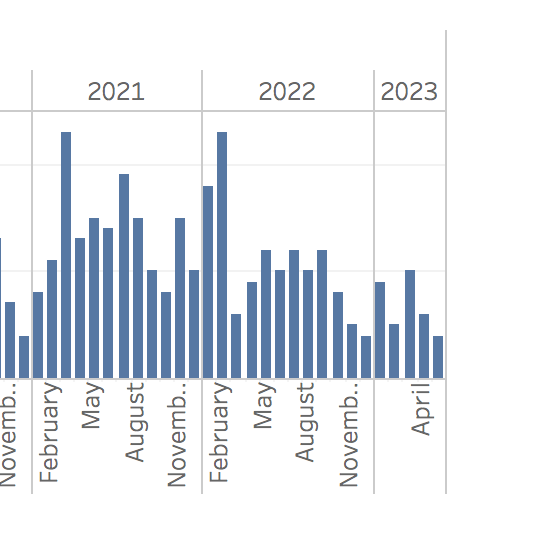
An intense debate over what had frequently been referred to as the “kitchen rule” was settled in 2021. City Council approved a change to the homestay ordinance that allowed property owners to rent out spaces including a stove, full-size refrigerator or sink on a short-term basis. The practice had been banned in 2018 in an effort to preserve spaces for long-term renters.
Sage Turner was the only Council member to vote against the change, citing concerns that more residents would be displaced by apartment conversions into STRs. “I think the kitchen [rule change] is a risk,” she said at the Dec. 14 meeting. “I just hope this doesn’t continue to push housing prices up.”
In January and February 2022, the two months immediately following Council’s vote, homestay applications did see a boost, with 18 and 23 requests for new permits, respectively. But that momentum didn’t last throughout the rest of the year, and 2022 ended with 32 fewer new permit requests than did 2021.
Elizabeth Putnam, who works as a real estate agent at Mosaic Realty, says the rule change may have contributed to the short-lived bump in homestay permits. However, it doesn’t appear to have led to a flood of residents taking away long-term housing from the market.
“I don’t think that the change was superimpactful, other than it gave people flexibility to do with their property what they wanted to do with their property,” says Putnam, who is also serving her first term on the BCTDA board as the vacation rental industry representative. “Does [not having a kitchen] drive people to or from a short-term rental? No. The reality is that people come to Asheville to eat in local restaurants, and they’re not coming to cook in their short-term rental.”
Value proposition
Xpress cross-referenced city permits with Buncombe County property records and tax information to determine those homestays’ property values and ownership. The data shows that the majority of homestays (522) are in homes with an assessed tax value of less than $449,000.
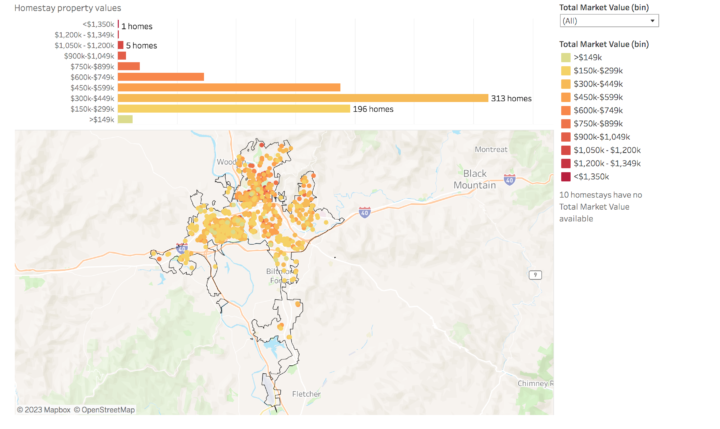
Of those properties, 313 were valued between $300,000 and $449,000, with another 196 valued between $150,000 and $299,000. Per county data, the current median tax valuation of a home in Asheville is $295,000; about three-quarters of permitted homestays are thus located in homes with values above the median.
Critics of the STR market often argue that homes purchased for use as vacation rentals take away long-term housing opportunities from those of modest means. (According to the city of Asheville’s homeownership calculator, a family of four earning the area median income of about $90,300 could afford a home of about $340,000 at a 30-year fixed interest rate of 7%, assuming they spend no more than the recommended 30% of income on housing and make a 20% down payment.)
But Ben Williamson, a housing and occupancy tax reform activist who founded the nonprofit Buncombe Decides, says he doesn’t see homestays as having the same impact as other STRs. Homestays require operators to live on-site, he explains, so they continue to serve as housing stock.
“To me, they’re a bit different, which is why municipalities like Asheville often treat them differently. We know living here is hard and expensive for many, and homestays can be a way to get bills paid for some homeowners,” Williamson says. “While you’re starting to see more landlords break up whole homes into single rooms and offer them to long-term renters, the STR homestays aren’t pulling entire homes off the long-term rental market, which feels like the bigger, more urgent, issue to address.”
Side hustlin’
To get a sense of where homestays are located in the city, Xpress overlaid homestay permit data with census tract boundaries. The biggest concentration of homestay properties (205) was located in Buncombe County census tracts 10 and 11, adjacent to each other in West Asheville.
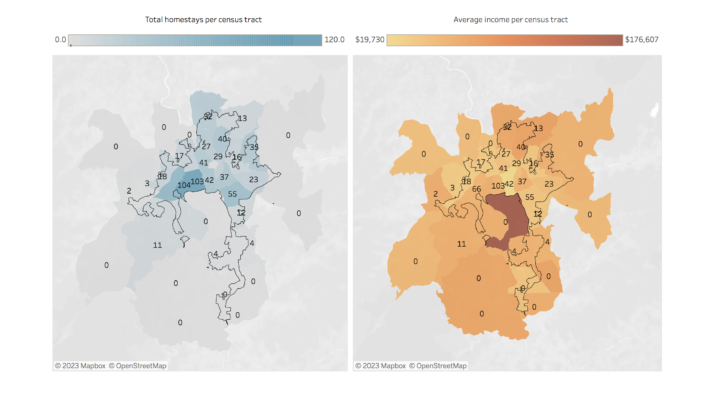
The federal government collects a lot of data at the census-tract level, including income. These aggregate income estimates, while not necessarily representative of STR operators, provide a sense of the wealth of people living in a given area.
Tracts 10 and 11 had median annual incomes of about $56,300 and $62,900, respectively, in 2021. Those areas are roughly in line with the citywide 2021 median income of about $58,200.
But homestays can be found across Asheville, from the comparatively wealthy census tract 5 (including Grove Park, median income about $74,400 in 2021) to the relatively poor tract 9 (including Southside, median income about $19,700). Some residents rent their properties to help cover costs such as mortgages and utilities. Others simply enjoy the extra income that renting provides.
“Financially, I don’t really need to do Airbnb,” says Asheville resident Wes Snoddy, who has rented two rooms in his Kenilworth house since 2018. He says that he works full time as a construction recruiter but that his rental also allows him to participate in Asheville’s tourism economy.
“It’s definitely a second job that I enjoy,” Snoddy continues. “I really think about how I can make it the best experience for my guests, and I’ve actually made some good friends over the years that have come back.”
“I like the decentralization of the gig economy,” adds Sara Manuel, who operates a homestay out of her residence near Biltmore Village. “It’s putting the power back in people’s hands. I think it’s great that people don’t have to have a huge investment to have a taxi company or a hotel and that you can do it on a small scale.”
Putnam, the real estate agent, says that converting residential homes into homestays has offered financial relief to some homeowners. But the practice isn’t for everyone.
“It’s not like 80% of the people looking in Asheville are looking for homestays so they can offset mortgages,” she says. “A lot of people that are moving into the Asheville area just want to live and have a residential home closer to amenities, and renting out that structure is not something they’re interested in.”
Who’s who?
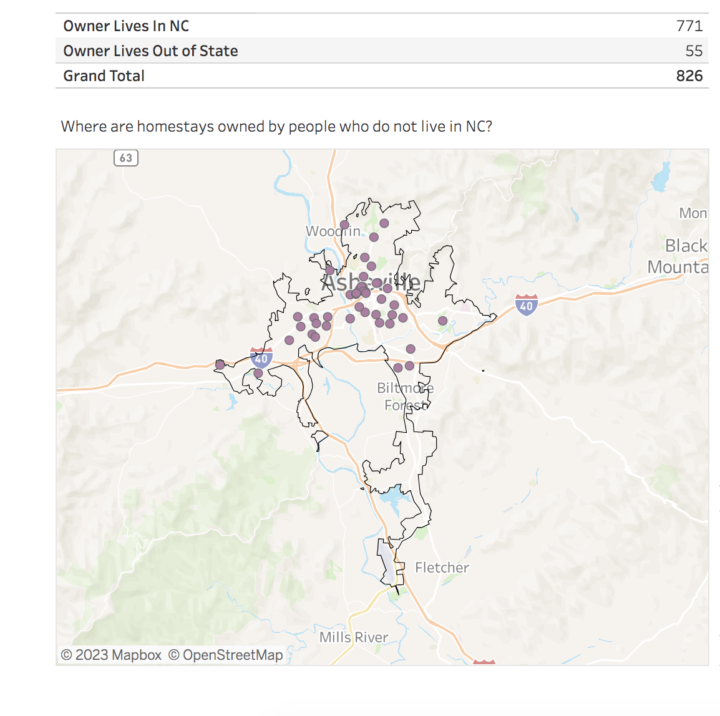
The city’s ordinance requires that homestay operators live at the residence that they are renting. But those operators don’t necessarily have to own the property.
By cross-referencing city permit data with county records, Xpress found that 55 of 826 active homestays are owned by someone with an out-of-state address. A majority of those out-of-state homeowners are Florida residents, with California residents making up the second-largest share. At least 19 additional homestays are owned by North Carolina residents with addresses outside of Asheville, including Charlotte, Black Mountain and Candler.
That information is not included on the city’s open data portal. Shannon Morgan, the city’s homestay code enforcement officer, explains that permits must be sought by the permanent resident of the homestay — who could be a tenant or employee of an outside owner.
As of December 2021, Morgan continues, Asheville requires nonresident property owners to submit additional documents with their homestay applications. The city’s rules prevent outside investors from owning multiple homestays simultaneously.
What’s next for homestays?
The legal landscape for homestays is constantly changing. Following a 2021 lawsuit in Wilmington, in which a judge found that city’s STR registration requirements to be out of compliance with state laws, Asheville changed its own ordinance.
Once approved by the city, homestay hosts are no longer required to reapply for permits each year. Instead, operators only pay a one-time application fee of $208. Regular annual inspections of homestay rentals have also been halted.
The changes worry some homestay operators, who say that loosening regulations will encourage more illegal units throughout the city and reduce host accountability.
“They stopped doing home inspections, so basically, you get licensed once, and then you can do whatever you want,” says homestay host Manuel. “It makes me wonder, ‘OK, so now is it just going to be a free-for-all?’”
Asheville officials say they will continue to monitor STR platforms to make sure permitted homestays don’t transition to whole-house rentals. “Most of the complaints we receive where homestays are concerned are from properties that never applied for a permit to begin with, so no, no longer having the requirement to do annual inspections has not made enforcement more difficult,” adds Todd Justice, a code compliance officer with the city.
And Putnam with Mosaic Realty says that Asheville’s homestay ordinance still acts as a deterrent to some would-be investors. Instead of buying in Asheville, she says, they seek properties outside city limits, where there are no restrictions on STRs.
Yet the landscape could soon shift once again. Senate Bill 667, filed in April by Republican state lawmakers, would take away most abilities of local and state leaders to regulate STRs. Affordable housing advocates say that the implications could be dire.
“Protecting existing rental inventory is just as important as building new units. The impact of our new $40 million affordable housing bond is greatly reduced when existing units are pushed off the market,” says Williamson of Buncombe Decides. “STR restrictions, though difficult to enforce and frustrating for some, may just be another example of our leaders being forced to leverage all the tools they have to fight to protect access to affordable housing for city and county residents.”
Explore the interactive visualization of the Xpress homestay analysis embedded here or at avl.mx/ctb. The underlying data is available as a .csv file at avl.mx/ctc.
Editor’s note: Author Brooke Randle co-operates a homestay in unincorporated Buncombe County, which was not included as part of this analysis.
This investigation was supported with funding from the Data-Driven Reporting Project. The Data-Driven Reporting Project is funded by the Google News Initiative in partnership with Northwestern University | Medill



When you pay the amount of taxes we pay in this county,one should be able to do whatever they want with their property! If the city tax isn’t going up the county is! Let’s start getting some money from the tourists who are sucking up all our infrastructure! Stop giving tax breaks to hotels we don’t need anymore. What kills me is a corporation can make all the money they want and don’t live here but residents are told what to do .
Thanks for doing this.
Getting public housing in shape and expanding the volume there is a big idea. There can be some ‘luxe mansion’ zoned areas, but very little.
Markets break and people on the wrong side of the median income can’t afford the punishment forever.
It’s not clear that you have any idea what this article is about. Most homestays are not operated in ‘luxe mansions.’ They’re just unfinished basements or garages converted to efficiency apartments.
Most homeowners hate being long term landlords to strangers on their primary home land. So the result of banning homestays via zoning is simply that homestays don’t exist, not that people are suddenly going to start converting their garages into apartments for people who can’t afford rent in downtown.
So, a handful of people can offset their cost of living with STRs, while driving it up for thousands of others in the area?
Sounds reasonable.
There’s no evidence that homestays drive up LTR prices, no apparent mechanism whereby that would occur, and considerable evidence that they make it easier for residents to afford their own homes.
This is one of the many reasons I voted against the affordable housing bond. Just another subsidy for tourism and the next big grift in the USA as it’s gonna open a massive can of worms in a town where the TDA is constantly undermining quality of life for resident taxpayers.
A homestay ban is a giveaway to nonlocal hotel developers that does nothing for the shortage of LTRs which drives up prices.
If you want more LTRs you have to let developers build apartment buildings and stop strangling projects in the crib with traffic and environmental studies and other NIMBY red tape.
The policies of strangling bureaucracies should be renamed blue tape.
Sage Turner, operating her own STR, should recuse from any vote regarding them. She seems to like rules that allow her version and oppose others. When on Council I fought for a few years for something like the current law. Free at last!
People visiting Asheville should be given options, as they always have, as to the way they which reside. I don’t feel you took the time to look into the whole problem before us. If the city would stop the illegal homestays and those that are run by companies/ or people from out of town who don’t respond to ill behavior in their rental, I think you would soon see most of the problems would no long be a problem. The problem is, once again, the city doesn’t want to do what is best for our community!